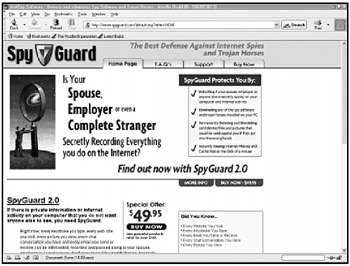DETECTING SPYWARE
|
|
The thought of unseen advertisers peeking at your browsing habits may unnerve you, but what may be more disconcerting is finding that someone you know, such as your boss, your spouse, or your parents, are secretly monitoring what you do on your computer through a desktop-monitoring program, otherwise known as spyware.
Spyware can capture screenshots of your activity, record every keystroke you type, track every program you use, and log how much time you spend using each program on the computer. Bosses use spyware to catch employees using their computers for personal activities, parents use spyware to make sure their kids don't visit forbidden sites, hackers use spyware to snare credit card numbers and passwords from unsuspecting victims, and spouses use spyware to gather proof that their husband or wife may be cheating on them. To see what type of spyware someone could plant on your computer, visit the Top Secret Software site (http://www.topsecretsoftware.com) and read about the different capabilities of various spyware programs.
Unlike ordinary programs that appear in a list of running programs tracked by the operating system, such as Windows XP, spyware programs bury themselves out of sight, so unsuspecting victims don't accidentally stumble across the program while it's running. Unless you suspect someone has planted spyware on your computer and you know where to look, chances are good that you'll never detect any spyware on your computer.
Several companies sell anti-spyware programs, such as Nitrous Anti-Spy (http://www.nitrousonline.com), PestPatrol (http://www.pestpatrol.com), SpyGuard (http://www.spyguard.com), and SpyCop (http://www.spycops.com). These programs, like the one shown in Figure 17-6, can search your hard disk for any traces of known spyware programs and keystroke loggers that someone may have slipped onto your computer.

Figure 17-6: Anti-spyware programs can keep someone from secretly monitoring your activity on the computer.
| Warning | Anti-spyware programs will not be able to detect hardware-based keystroke loggers that connect between a computer and the keyboard. |
Besides rooting through your hard disk for known spyware files, anti-spyware programs can also monitor the ports on your computer to detect any unauthorized communications being sent from your computer. Such clandestine communication is almost always the result of either adware, a remote access Trojan horse (see Chapter 8), or spyware, which may be trying to send a record of your activity to the email account of the person spying on you. An anti-spyware program can block such stealth communication from taking place, effectively shielding your privacy.
|
|
EAN: 2147483647
Pages: 215